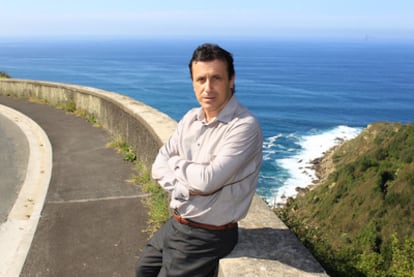ETA terrorists and victims face to face in search of reconciliation
A program set up by prisoners seeks to heal wounds caused by violence
With ETA in its death throes and Basque politicians and citizens wondering how to heal the wounds of half a century of terrorist violence, a group of eight people are taking an uncharted path.
In late May, four victims of terrorism agreed to meet face to face with four ETA convicts who now renounce their ties with the terrorist group. In one of the cases, the prisoner had been the actual killer of the person whose relative he was meeting. Iñaki García Arrizabalaga, a professor of Marketing at Deusto University in the Basque Country, was one of the participants in this mediation program, which was requested by the convicts and organized by prison authorities.
His father was murdered by ETA on October 23, 1980. "It was the first time that a terrorist had asked me for forgiveness," he told EL PAÍS. "It was quite striking. I think he felt better after talking to me. And I felt better after talking to him. I don't know if people will understand this, but we had the feeling that we were sowing something for the future."
This unusual meeting took place on May 25, 2011 inside a Vitoria office. García Arrizabalaga did not know, and still does not know, exactly who killed his father. The prisoner was serving time for blood crimes perpetrated in ETA's name, but had concluded that violence makes no sense anymore and has since strayed from the group. The first man wanted to know why the person in front of him had been a terrorist, why he had killed, how he could live with that, and what led him to a group that destroyed the lives of his mother and six siblings. The second man, above all, wanted to say he was sorry.
Like them, another six people met two by two over several days in May, either by themselves or with a mediator. Some meetings took place in jail, others outside if the prisoner was on day parole.
The victims who agreed to listen to the prisoners gave a face to the personal consequences of attacks, and showed what it means to be a family that's been broken in the name of some alleged "patriotic fight."
The meetings were confidential and there was no penitentiary benefit in it for the prisoners - the only way to guarantee that their interest was sincere, and that they sought no advantage beyond the strictly personal. The victims had no obligation to forgive, of course. The idea was for them to talk, and to listen if they so wished. They can abandon the program at any time they like.
The participating prisoners were all part of a larger group of ETA convicts who have publicly said that violence was useless and that the terrorist organization has no meaning any more. They are still a minority, although their explicit rejection of terrorism has got them transferred closer to home, to the Nanclares de Oca penitentiary in Álava province.
Each individual's motivations for participating in the program were different. In the victims' case - all children or widows of victims of ETA - the future weighed more heavily than the past. They were unsure whether the experience would help them personally and they all said they didn't need to be asked for forgiveness. Their real motivation was the hope that their initiative might represent a small step toward reconciliation in Euskadi - toward the creation of a peaceful future where there is no forgetting, but where their children and grandchildren might live without hatred.
Part two of the mediation program is underway with eight other participants; four victims and four prisoners who may meet face to face it they so wish.

Tu suscripción se está usando en otro dispositivo
¿Quieres añadir otro usuario a tu suscripción?
Si continúas leyendo en este dispositivo, no se podrá leer en el otro.
FlechaTu suscripción se está usando en otro dispositivo y solo puedes acceder a EL PAÍS desde un dispositivo a la vez.
Si quieres compartir tu cuenta, cambia tu suscripción a la modalidad Premium, así podrás añadir otro usuario. Cada uno accederá con su propia cuenta de email, lo que os permitirá personalizar vuestra experiencia en EL PAÍS.
¿Tienes una suscripción de empresa? Accede aquí para contratar más cuentas.
En el caso de no saber quién está usando tu cuenta, te recomendamos cambiar tu contraseña aquí.
Si decides continuar compartiendo tu cuenta, este mensaje se mostrará en tu dispositivo y en el de la otra persona que está usando tu cuenta de forma indefinida, afectando a tu experiencia de lectura. Puedes consultar aquí los términos y condiciones de la suscripción digital.








































